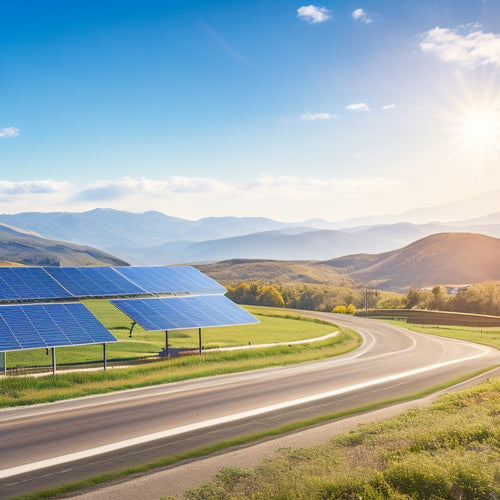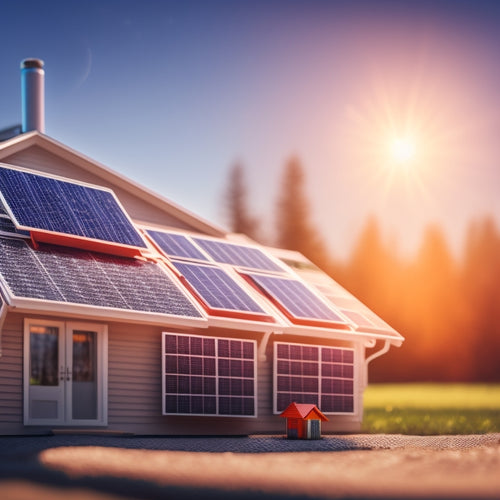
Why Conduct a Home Energy Efficiency Audit?
Share
By conducting a home energy efficiency audit, you'll reveal hidden energy wasters, identify areas of energy waste, and optimize your home's comfort levels. You'll also improve indoor air quality, reduce energy bills, and enhance your home's value. Plus, you'll support a sustainable future and decrease your carbon footprint. Additionally, an audit will uncover potential safety risks, allowing you to take corrective action. By identifying these issues, you'll be enabled to make informed decisions about energy conservation, and by exploring these findings in greater depth, you'll find the many ways a more efficient home can improve your daily life.
Overview
- Conducting a home energy efficiency audit reveals hidden energy wasters, insulation gaps, and usage patterns to optimize energy consumption.
- Energy audits identify areas of energy waste, leading to cost savings through behavioral changes, appliance upgrades, and HVAC system optimization.
- A home energy audit improves indoor air quality, reduces moisture buildup, and enhances thermal regulation, ensuring consistent comfort levels throughout the home.
- Energy-efficient upgrades and audits increase property value, attract potential buyers, and provide a competitive edge in the real estate market.
- Regular energy audits support a sustainable future by reducing environmental impact, promoting eco-friendly practices, and contributing to climate action initiatives.
Identify Hidden Energy Wasters
Your home's energy efficiency is only as strong as its weakest link, and hidden energy wasters can be major culprits in driving up your utility bills.
Energy leaks, insulation gaps, and inefficient appliances are common culprits. Conducting a thorough energy audit, including load profiling, can help identify these energy wasters and provide a detailed illustration of your home's utility usage.
By pinpointing areas of inefficiency, you'll gain homeowner awareness and take the first step toward cost savings.
Behavioral changes, such as adjusting your thermostat or turning off lights, can also make a significant impact.
With energy monitoring, you can track your progress and make informed decisions to optimize your home's energy efficiency.
Reduce Your Energy Bills
Energy-conscious homeowners can breathe a sigh of relief: reducing energy bills is a tangible goal within reach. By conducting a home energy efficiency audit, you'll uncover areas where energy is being wasted and identify cost-effective solutions to rectify them.
Implementing energy-saving tips such as sealing air leaks, upgrading to energy-efficient appliances, and optimizing your HVAC system can lead to significant reductions in your energy bills. Advanced battery systems, such as those that detect and store excess energy, can also play an essential role in reducing energy waste.
Optimize Home Comfort Levels
You can greatly impact your home's comfort levels by ensuring proper ventilation and energy access sustainable financing for rural communities.
Inadequate ventilation can lead to moisture buildup, mold growth, and indoor air pollution, while uneven temperature distribution can cause hotspots and drafts.
Proper Ventilation Matters
Proper ventilation plays an essential role in maintaining ideal home comfort levels by regulating indoor air quality, temperature, and humidity. Effective airflow management is vital in removing stale air and introducing fresh air, ensuring a healthy and comfortable living space. A well-designed ventilation system can greatly impact your home's energy efficiency and overall livability.
| Ventilation Component | Function | Impact on Comfort |
|---|---|---|
| Supply Ventilation | Introduces fresh air into the home | Regulates indoor air quality and humidity |
| Exhaust Ventilation | Removes stale air from the home | Reduces moisture buildup and pollutants |
| Whole-House Ventilation | Combines supply and exhaust ventilation | Maintains consistent indoor air quality and temperature |
| Spot Ventilation | Targets specific areas with high moisture (e.g., bathrooms) | Reduces humidity and prevents mold growth |
Even Temperature Distribution
Achieving even temperature distribution throughout your home is essential for optimizing comfort levels and creating a cozy living space.
When you conduct a home energy efficiency audit, you'll identify areas where thermal regulation can be improved. This might involve upgrading insulation, sealing air leaks, or adjusting your HVAC system.
By doing so, you'll create comfort zones throughout your home, ensuring that every room is at a consistent, comfortable temperature. This is especially important in areas with extreme temperatures, where uneven heating or cooling can lead to energy waste and discomfort.
Improve Indoor Air Quality
Airborne pollutants can exacerbate respiratory issues, allergic reactions, and other health problems, making indoor air quality a critical aspect of home energy efficiency.
You can improve indoor air quality by identifying and addressing pollutant sources, such as mold, dust, and pet dander. Effective air filtration systems can capture these pollutants, while humidity control and ventilation systems help maintain a healthy air circulation.
By optimizing air circulation, you can create comfort zones throughout your home, reducing the need for energy-intensive heating and cooling. Additionally, energy recovery systems can reclaim heat energy from exhaust air, further reducing your energy consumption.
Enhance Your Home's Value
By investing in energy-efficient upgrades, you'll not only reduce your energy consumption but also increase your property's worth.
A home energy efficiency audit can help you identify areas for improvement, which can then be used to enhance your resale value.
As a result, you'll be able to attract potential buyers and command a higher selling price when you decide to put your home on the market.
Increase Property Worth
One of the most notable advantages of investing in home energy efficiency is that it can considerably increase your property's worth.
By implementing energy-saving measures, you're not only reducing your energy consumption but also making your property more attractive to potential buyers. Property upgrades, such as energy-efficient windows, insulation, and solar panels, can greatly enhance your property's value.
Additionally, energy incentives, like tax credits and rebates, can offset the cost of these upgrades. As a result, your property becomes more desirable and beneficial, giving you a competitive edge in the market.
Boost Resale Value
As you make your property more energy-efficient, you're not only saving energy and reducing your carbon footprint, but you're also taking a significant step towards enhancing its resale value.
By investing in energy-efficient upgrades, you'll appeal to the growing number of eco-conscious buyers who prioritize sustainability. According to market trends, homes with energy-efficient features are in high demand, and buyers are willing to pay a premium for them.
In fact, studies have shown that energy-efficient homes can sell for up to 10% more than comparable properties without these features.
Support a Sustainable Future
Nearly 70% of the world's energy is consumed by buildings, making them a significant contributor to greenhouse gas emissions.
By conducting a home energy efficiency audit, you'll be taking an essential step towards reducing your environmental impact. You'll identify opportunities to incorporate eco-friendly practices, sustainable materials, and green technologies into your home.
This won't only minimize your carbon footprint but also promote responsible consumption and resource management. By embracing energy conservation, you'll be supporting a sustainable future and contributing to climate action.
Uncover Potential Safety Risks
Conducting a home energy efficiency audit also reveals potential safety risks lurking in your home. You might be unaware of these hazards, but a thorough audit will identify them, ensuring you can take corrective action.
For instance, a professional auditor may detect faulty electrical wiring, which can cause electrical shocks or even fires. They may also identify structural integrity issues, such as cracks in your foundation or weakened roof supports, that can lead to collapse or other safety hazards.
Frequently Asked Questions
Can I Perform a Home Energy Audit Myself, or Do I Need a Pro?
You can perform a DIY audit, but hiring a pro offers benefits like specialized equipment and knowledge, providing a more thorough assessment and actionable recommendations for maximizing energy efficiency and cost savings.
How Long Does a Typical Home Energy Efficiency Audit Take to Complete?
You'll spend around 2-4 hours on a typical home energy audit, depending on your home's size and complexity, with audit duration influenced by time factors like inspection scope, equipment usage, and auditor proficiency.
Are Energy Audits Only for Older Homes or Also for New Construction?
You'll find that energy audits aren't just for older homes; they're also beneficial for new constructions, debunking the common audit misconception that only older homes need improvement, helping you optimize energy efficiency from the start.
Will an Energy Audit Identify Issues With My Home's Insulation?
You'll uncover insulation deficiencies and identify areas where heat escapes through air leaks, determining if your home needs more insulation, and what types, such as fiberglass, cellulose, or spray foam, are best suited to optimize energy efficiency and comfort.
Do Energy Audits Also Evaluate Water Usage and Conservation Opportunities?
As you immerse yourself in the world of energy audits, you'll find that, yes, they do assess water usage and identify opportunities for water conservation, laying the groundwork for efficiency upgrades that'll save you money and resources.
Ready to Buy
So, you've made it this far - congrats on not being completely oblivious to your home's energy-guzzling habits! Conducting a home energy efficiency audit is like shining a flashlight into the dark recesses of your energy-wasting soul. You'll uncover hidden energy vampires, slash those pesky bills, and bask in the glow of optimized comfort levels. Not to mention, you'll enhance your home's value, support a sustainable future, and avoid potential safety risks. Now, get auditing and stop hemorrhaging energy (and cash)!
Related Posts
-

Is Switching to Green Energy Solutions Easy
Switching to green energy solutions isn't just easy; it's also beneficial. You can greatly cut utility costs and enjo...
-

A Beginner's Guide to Navigating the Solar Investment Tax Credit
You're eligible to claim a significant Solar Investment Tax Credit (ITC) of 30% of total installation costs, but mane...
-

Designing a Green Roof for Maximum Energy Efficiency
Designing a green roof for maximum energy efficiency involves several key strategies. Start by selecting native, drou...


